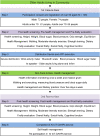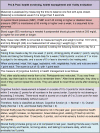Evaluation of health factors on artificial intelligence and the internet of things-based older adults healthcare programmes
- PMID: 38882246
- PMCID: PMC11179518
- DOI: 10.1177/20552076241258663
Evaluation of health factors on artificial intelligence and the internet of things-based older adults healthcare programmes
Abstract
Objective: This study evaluates Artificial intelligence and the Internet of Things-based older adults' healthcare programmes (AI·IoT-OAHPs), which offer non-face-to-face and face-to-face health management to older adults for health promotion.
Methods: The study involved 146 participants, adults over 60 who had registered in AI·IoT-OAHPs. This study assessed the health factors as the outcome of pre- and post-health screening and health management through AI·IoT-OAHPs for six months.
Results: Preand post-health screening and management through AI·IoT-OAHPs were evaluated as significant outcomes in 14 health factors. Notably, the benefits of post-cognitive function showed a twofold increase in older female adults through AI·IoT-OAHPs. Adults over 70 showed a fourfold increase in post-walking days, a threefold in post-dietary practice, and a twofold in post-cognitive function in the post-effects compared with pre via AI·IoT-OAHPs.
Conclusions: AI·IoT-OAHPs seem to be an effective program in the realm of face-to-face and non-face-to-face AI·IoT-based older adults' healthcare initiatives in the era of COVID-19. Consequently, the study suggests that AI·IoT-OAHPs contribute to the upgrade in health promotion of older adults. In future studies, the effectiveness of AI·IoT-OAHPs can be evaluated as a continuous project every year in the short term and every two years in the long term.
Keywords: Artificial intelligence and internet of things; health factors; health screening and management; older adults.
© The Author(s) 2024.
Conflict of interest statement
The authors declared no potential conflicts of interest with respect to the research, authorship, and/or publication of this article.
Figures

















Similar articles
-
Integrating AI·IoT-OAHPs with existing elderly care systems.Digit Health. 2025 Jan 28;11:20552076251317378. doi: 10.1177/20552076251317378. eCollection 2025 Jan-Dec. Digit Health. 2025. PMID: 39877855 Free PMC article.
-
Perceptions of registered nurses on facilitators and barriers of implementing the AI-IoT-based healthcare pilot project for older adults during the COVID-19 pandemic in South Korea.Front Public Health. 2023 Oct 10;11:1234626. doi: 10.3389/fpubh.2023.1234626. eCollection 2023. Front Public Health. 2023. PMID: 37886046 Free PMC article.
-
Present and Future of AI-IoT-Based Healthcare Services for Senior Citizens in Local Communities: A Review of a South Korean Government Digital Healthcare Initiatives.Healthcare (Basel). 2024 Jan 22;12(2):281. doi: 10.3390/healthcare12020281. Healthcare (Basel). 2024. PMID: 38275561 Free PMC article. Review.
-
IoT in medical diagnosis: detecting excretory functional disorders for Older adults via bathroom activity change using unobtrusive IoT technology.Front Public Health. 2023 Sep 29;11:1161943. doi: 10.3389/fpubh.2023.1161943. eCollection 2023. Front Public Health. 2023. PMID: 37841702 Free PMC article.
-
Exploring the Role of Artificial Intelligence in Internet of Things Systems: A Systematic Mapping Study.Sensors (Basel). 2024 Oct 10;24(20):6511. doi: 10.3390/s24206511. Sensors (Basel). 2024. PMID: 39459993 Free PMC article. Review.
Cited by
-
Surface Electromyography Combined with Artificial Intelligence in Predicting Neuromuscular Falls in the Elderly: A Narrative Review of Present Applications and Future Perspectives.Healthcare (Basel). 2025 May 21;13(10):1204. doi: 10.3390/healthcare13101204. Healthcare (Basel). 2025. PMID: 40428040 Free PMC article. Review.
-
Integrating AI·IoT-OAHPs with existing elderly care systems.Digit Health. 2025 Jan 28;11:20552076251317378. doi: 10.1177/20552076251317378. eCollection 2025 Jan-Dec. Digit Health. 2025. PMID: 39877855 Free PMC article.
-
Social and Activity Participation and Subjective Well-Being Among Older Adults in Japan: A Comparative Analysis of Healthy and Care-Needing Groups.J Aging Res. 2025 Jul 28;2025:5990506. doi: 10.1155/jare/5990506. eCollection 2025. J Aging Res. 2025. PMID: 40761681 Free PMC article.
References
-
- Qian K, Zhang Z, Yamamoto Y, et al. Artificial intelligence internet of things for the elderly: From assisted living to health-care monitoring. IEEE Signal Process Mag 2021; 38: 78–88.
-
- Thakare V, Khire G, Kumbhar M. Artificial intelligence (AI) and internet of things (IoT) in healthcare: Opportunities and challenges. ECS Trans 2022; 107: 7941–7951.
-
- Djenouri Y, Belhadi A, Yazidi A, et al. Artificial intelligence of medical things for disease detection using ensemble deep learning and attention mechanism. Expert Syst 2022;41(6): e13093.
-
- KHPI (Korea Health Promotion Institute). AI/IoT-based senior health care programs, https://www.khepi.or.kr/board?menuId=MENU01692&siteId=null-(2023, accessed 20 June. 2023).
Publication types
LinkOut - more resources
Full Text Sources

